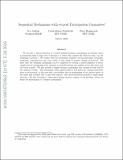| dc.contributor.author | Ashlagi, Itai | |
| dc.contributor.author | Daskalakis, Konstantinos | |
| dc.contributor.author | Haghpanah Jahromi, Nima | |
| dc.date.accessioned | 2017-07-25T17:12:41Z | |
| dc.date.available | 2017-07-25T17:12:41Z | |
| dc.date.issued | 2016-07 | |
| dc.identifier.isbn | 9781450339360 | |
| dc.identifier.uri | http://hdl.handle.net/1721.1/110836 | |
| dc.description.abstract | How should one sell an item to a buyer whose value for the item will only be realized next week? E.g. consider selling a flight to some executive who may or may not have a meeting with a client next week. Suppose that both the seller and the buyer only know a distribution, F, from which the buyer's value, v, for the item will be drawn. One way the seller could go about this sale is to make a take-it-or-leave-it offer today. The offer reads "pay the expected value today to get the item next week". A risk-neutral buyer would find this offer attractive, hence the seller would extract the full surplus. The unsettling feature of the afore-described mechanism is that, for some realizations of v, the bidder ends up with negative utility. In particular, while our mechanism is interim Individually Rational (IR), it is not ex-post IR. How could we fix this? One way is to wait until next week when the value is realized and make a take-it-or-leave-it offer of the item at an optimal monopoly price. The new mechanism is clearly ex-post IR, but its revenue could be much smaller than that of the previous one. Still, this trivial mechanism extracts the best possible revenue among all ex-post IR mechanisms, as a simple argument can establish. However, this optimality argument fails when several items are to be sold over consecutive periods. In this paper, we provide a characterization of the revenue-optimal, ex-post IR, dynamic mechanism selling k items over k periods to a bidder whose values are independent. In particular, we optimize the seller's revenue subject to the following strong individual rationality condition: at each period, the stage utility of the agent, defined to be the surplus from that period's allocation minus the agent's payment, must be non-negative. In particular, the non-negativity of the stage utilities implies that, at the end of each period, the agent's realized utility from participating in the mechanism so far is non-negative. We provide extensions to multiple bidders and an infinite horizon with discount factors. | en_US |
| dc.description.sponsorship | United States. Office of Naval Research (grant N0 0014-12-1-0999) | en_US |
| dc.description.sponsorship | National Science Foundation (U.S.) (Award CCF-0953960 (CAREER)) | en_US |
| dc.description.sponsorship | National Science Foundation (U.S.). Division of Computing and Communication Foundations (CCF-1551875) | en_US |
| dc.description.sponsorship | National Science Foundation (U.S.). Division of Computing and Communication Foundations (SES-1254768) | en_US |
| dc.language.iso | en_US | |
| dc.publisher | Association for Computing Machinery | en_US |
| dc.relation.isversionof | http://dx.doi.org/10.1145/2940716.2940775 | en_US |
| dc.rights | Creative Commons Attribution-Noncommercial-Share Alike | en_US |
| dc.rights.uri | http://creativecommons.org/licenses/by-nc-sa/4.0/ | en_US |
| dc.source | arXiv | en_US |
| dc.title | Sequential Mechanisms with Ex-post Participation Guarantees | en_US |
| dc.type | Article | en_US |
| dc.identifier.citation | Ashlagi, Itai, Constantinos Daskalakis, and Nima Haghpanah. “Sequential Mechanisms with Ex-Post Participation Guarantees.” Proceedings of the 2016 ACM Conference on Economics and Computation - EC ’16 (2016). | en_US |
| dc.contributor.department | Massachusetts Institute of Technology. Computer Science and Artificial Intelligence Laboratory | en_US |
| dc.contributor.department | Massachusetts Institute of Technology. Department of Electrical Engineering and Computer Science | en_US |
| dc.contributor.mitauthor | Daskalakis, Konstantinos | |
| dc.contributor.mitauthor | Haghpanah Jahromi, Nima | |
| dc.relation.journal | Proceedings of the 2016 ACM Conference on Economics and Computation - EC '16 | en_US |
| dc.eprint.version | Original manuscript | en_US |
| dc.type.uri | http://purl.org/eprint/type/ConferencePaper | en_US |
| eprint.status | http://purl.org/eprint/status/NonPeerReviewed | en_US |
| dspace.orderedauthors | Ashlagi, Itai; Daskalakis, Constantinos; Haghpanah, Nima | en_US |
| dspace.embargo.terms | N | en_US |
| dc.identifier.orcid | https://orcid.org/0000-0002-5451-0490 | |
| dc.identifier.orcid | https://orcid.org/0000-0001-8066-7777 | |
| mit.license | OPEN_ACCESS_POLICY | en_US |
